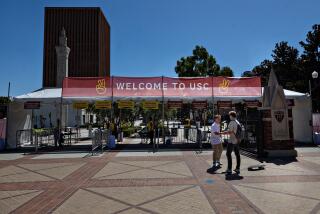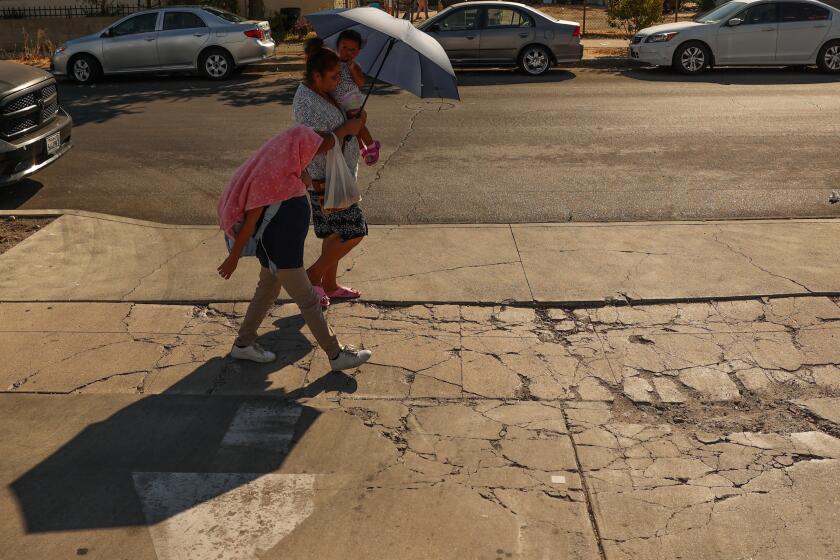New rules could keep San Francisco community college open
The battle to save San Francisco’s community college may finally be resolved as a private panel on Wednesday announced new rules that could allow the troubled institution to retain accreditation.
Under the proposed policy, the City College of San Francisco would be able to apply to restore its accreditation, make a case that it has made substantial improvements and, after an evaluation, be allowed up to an additional two years to fully comply with standards, according to a statement from the Accrediting Commission for Community and Junior Colleges.
------------
FOR THE RECORD
June 12, 12:24 p.m.: An earlier version of this post stated that a December review by federal officials identified a number of problems at the City College of San Francisco campus. The review found problems at the Accrediting Commission for Community and Junior Colleges, which is responsible for accrediting the college.
------------
The Novato-based panel has come under intense pressure from community leaders, college administrators, faculty, students and lawmakers to grant the 80,000-student school a reprieve from a July 31 deadline.
“This change in policy to provide for an accreditation restoration status would protect the students” and give the school time to comply with the agency’s rules, said Barbara Beno, president of the commission. “This is not a free pass, but a careful process of holding the college accountable for implementing new and sustained practices that meet standards of quality within two years.”
The proposed policy will have a two-week review period before the 19-member commission takes a final vote. The policy must also be approved by the U.S. Department of Education to ensure it is not in conflict with federal regulations. If approved, the changes would apply to all 112 of the state’s two-year schools as well as campuses in Hawaii and the Pacific.
“The commission has met with the department on this, they have been productive meetings and we’re hopeful they’ll sign off,” said commission spokesman David Hyams.
Officials at City College, the state’s largest single education institution, said they were still reviewing the proposed policy change.
“We’re cautiously optimistic,” said spokesman Larry Kamer. “There’s more analysis to be done, but as has been the case from the beginning City College is going to do everything in its power to keep its accreditation. The reason we’re most optimistic is we have transformed City College in the last two years into a much more sustainable, accountable and responsible organization.”
The new action is poised to end a year of acrimony that saw the college’s enrollment plummet, as students feared the institution would lose federal and state funding and, ultimately, close.
The commission, meanwhile, argued that it must move forward with the termination, citing federal requirements that colleges be given no more than two years to comply with standards or lose accreditation. This came despite an opinion from a senior education official concluding that it had authority to extend accreditation for good cause.
The panel moved last year to revoke accreditation as of July, citing long-running financial and governance problems, including failing to track the academic progress of many students, not providing sufficient student support services and failing to maintain adequate reserves.
In a presentation last week, system-wide Chancellor Brice Harris and City College Chancellor Arthur Q. Tyler, told commission members that the college has addressed 95% of the deficiencies cited by the panel and argued for more time to meet standards.
The state chancellor’s office is “encouraged that that the commission appears willing to provide City College with a path forward to complete its recovery,” spokesman Paul Feist said. “We want to be assured, however, that any action taken removes the immediate threat of loss of accreditation and allows City College adequate time to come into full compliance.”
The commission, part of the Western Assn. of Schools and Colleges, is one of seven private regional accrediting groups recognized by the U.S. Department of Education. The California commission is made up of college faculty, administrators and members of the public.
Its record of aggressively sanctioning the state’s two-year schools has been questioned, with critics alleging many actions are tainted by conflicts of interest and political bias -- charges the agency has denied.
The July termination was on hold, pending the outcome of a lawsuit filed by San Francisco’s city attorney questioning the panel’s political motives and procedures. The trial is scheduled to start in October.
And in a December review, federal officials identified a number of problems at the commission, which need to be corrected within a year. These include ensuring that its standards and policies are widely accepted, demonstrating that faculty are represented on its evaluation teams, and providing schools with more clearly written reports on whether they meet standards.
U.S. Rep. Jackie Speier (D-Hillsborough), said she will still press to hold the agency more accountable for its actions.
“I’ve been very critical of them … and they appeared to be tone deaf for a very long period of time,” Speier said. “It appears they’ve found a way to get this terrible situation under control by crafting a new policy that allows 80,000 students to continue their education. But anything that is self-appointed and self-regulating is not good for public policy and I think there needs to be a comprehensive look at what makes sense moving forward.”
More to Read
Sign up for Essential California
The most important California stories and recommendations in your inbox every morning.
You may occasionally receive promotional content from the Los Angeles Times.











